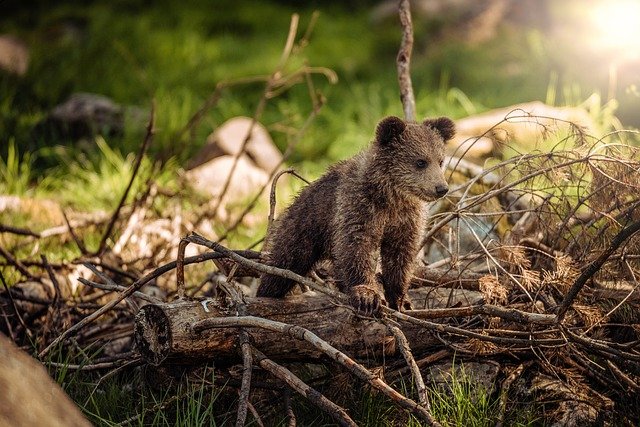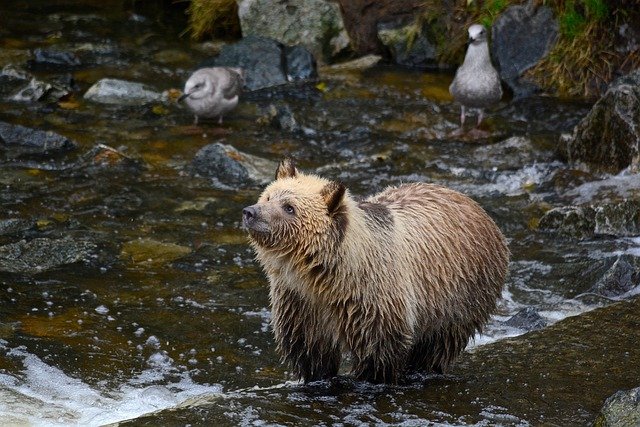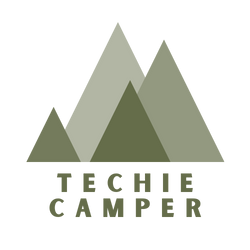While bears are fun to visit in a zoo or similarly controlled environment, coming face-to-face with a grizzly in the wilderness isn’t what we’d consider a good time. While it’s likely that any bear you encounter will be more scared of you than anything else, a frightened 250-pound bear is still an extremely dangerous proposition for an unprepared hiker or adventurer.
Regardless, you shouldn’t let the threat of a bear attack dampen your camping plans. Violent bear encounters are few and far between, and they’re quite preventable if you’ve got a basic understanding of what to do and what not to do in a bear-filled camping area.
15 Tips For Keeping Bears Away From A Campsite
- Keep all food and drink items away from your tent. Don’t tempt fate for a midnight snack!
- Even it’s a picturesque summer’s night, be sure to always sleep in your tent. Accidentally mimicking prey while slumbering is not the smartest option.
- If your campground makes bear-resistant food storage containers available, use them!
- Resist the urge to approach bears for an Instagram photo opportunity. Usually, if you leave them be, they’ll do the same.
- Be sure to keep a flashlight near your sleeping bag in your tent. You can use the light to spook a bear away or look for approaching danger in the middle of the night.
- If you have any garbage or food waste that can’t be properly disposed of in a campground-provided dumpster, pack it out!
- Do your best not to pack in foods that have distinct aromas likely to grab a bear’s attention. Leave the bacon, hamburger meat, and fish fillets at home if you can.
- When setting up your campsite, where you put down your stakes matters! Try to set up camp a safe distance away from trails, bear warning signs, dead animal carcasses, fruit trees, or berry patches.
- Don’t bury your trash! Dispose of it in bear-safe campground dumpsters or pack it out with you.
- Keep a distance of at least 100 yards between all food storage/cooking areas and your sleeping arrangements. Anything that’s considered a tasty tree by a brown bear should be as far away as possible.
- Leash your pets and keep an eye on them. A curious family dog has a better chance of provoking a bear than you do. And make sure to get a dog-friendly camping tent to stay comfortable too!
- If there are no bear-safe food storage boxes available at your campsite, store all your perishables in your vehicle (provided it has a hard outer shell like a family sedan or SUV.)
- Change your clothes after cooking. It’s not only considerate of those camping with you, but it also will decrease your chances of having a bear associate you with food.
- If you have food caches that you are backpacking in and out, make dang sure that they’re bear-resistant before leaving food in them overnight.
- It pays to invest in bear spray. You may never have to use it. But, you’re better safe than bear food.

What Attracts Bears To Campsites?
Think like a bear for a minute. If you lived near a campground where food is plentiful and often wasted by campers in large amounts, why would you go through all the trouble of killing your dinner when a potential feast is right there waiting for you?
Bears are predators. They are driven by the need to survive and the desire for a good meal. And their idea of a tasty brunch or early supper is a bit different than yours. While normal food items such as raw meats, fruits, vegetables, and sweets are liable to capture a black bear’s attention, their idea of what’s worth eating goes far beyond those tasty treats.
Here’s a list of other edible items that bears might be attracted to when sniffing around your camping grounds:
- Toothpaste
- Mouthwash
- Bug repellent
- Sunscreen
- Lipsticks and blushes
- Lotions
- Any garbage with a distinct scent
- Used cooking pots
- Used silverware
- Oils used for cooking
- Fuel used for lighting lanterns
- Fuel used for lighting a stove
- Canned beverages such as beer or soda
- Used Tupperware or any container with traces of food in it
In short, anything that smells interesting might be considered food by a hungry bear. The better that you control your environment and limit the range of scents that might stoke a bear’s curiosity, the better chance you have of keeping an unwanted furry visitor from making a campsite cameo when you least expect it.

How To Survive When Encountering A Bear
While it ultimately depends on mood and circumstance, most bears actively try to avoid humans as much as they can. They’re usually more interested in the smelly stuff you’re packing in and out of a campsite than you.
Most bear encounters are brief, peripheral, and end with the bear running away. If you have a brief meeting with a bear that ends with it fleeing the scene, take special care not to facilitate another meeting. If the meeting was at your campsite, that means either moving to a different spot or taking extra care to limit scents that might be attractive to other bears.
And if you have your dog with you on your camping trip, always make sure they are leashed or within distance to brush them away from any bears.
If a bear doesn’t run away, you need to remain calm. Don’t run and don’t audibly freak out and/or scream. A fear response like that could trigger a bear into confusing you with prey. And that’s not a position you need to put yourself in.
When a bear doesn’t flee, the hope is that it’s indifferent to your presence. Do your best not to threaten the bear, talking to it while backing away slowly. If it backs away when you back away, repeat the process until you’re a safe distance away.
If it starts to approach you with any of the following predatory behaviors, you may need to change your tact:
- Walking towards you calmly, quietly, and with its ears forward.
- Gnashing and chomping its teeth.
- Bobbing and weaving its head.
- Slapping the ground with its front paws.
- Woofing or barking.
- Smacking their lips.
- Salivating.
In this case, you’ll need to stand your ground and double down. Stand up straight and wave your arms slowly yet confidently. Yell at the bear in a firm voice. Wave a stick if you have to. Also, get a hand on your bear spray just in case. The more you can mimic a fellow predator, the better chance you have of getting a predatory bear to back off.
If this tact doesn’t work or the bear seems more territorial and spooked than anything else, your last resort is to sprawl on the ground flat, taking care to position your arms to protect your neck and head. If you’re wearing a backpack, keep it on to limit potential attack areas on your body.
If the bear attacks, try to keep this position and remain calm. If it appears to leave the area, make sure it has before getting up. You don’t want to accidentally trigger its fear or predatory response for a second time.
Bear In Mind
Bear attacks are exceedingly rare. But, they’re a real possibility if you’re in the wrong spot at the wrong time. Take the precautions listed above to protect yourself and your loved ones from potential bear encounters on your next forest camping trip. A little bit of preparation and mindfulness could spell the difference between a fun weekend and a horrifying experience.
